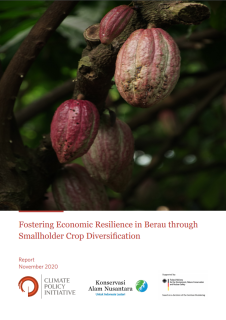
This study explores crop diversification opportunities to support independent smallholders in Berau for better long-term outcomes, outlining options to push Berau towards economic resilience and achieve its sustainability goals. It is, therefore, replicable across regencies in Indonesia, especially those with similar attributes as Berau. The key findings are as follows:
- Palm oil has been a popular livelihood option among independent smallholders in Berau, but is insufficient to cover minimum living costs and creates risks.
- Compared to palm oil monocrops, crop diversification can yield up to 800% more revenue for smallholders.
- Diversification of crops can potentially absorb the business risks faced by palm oil smallholders, while remaining in line with Berau’s sustainability agenda.
- For smallholders who own vacant lands specifically allocated for planting, it is less financially risky to start crop diversification when the existing palm oil plantation is at peak productivity (approximately year 10) than to begin during unproductive years.
This study also formulates key recommendations for Berau’s government. These recommendations have the potential to be replicated across other regencies in Indonesia that have similar attributes, to encourage crop diversification and use finance as a lever to drive crop diversification by palm oil smallholders.
